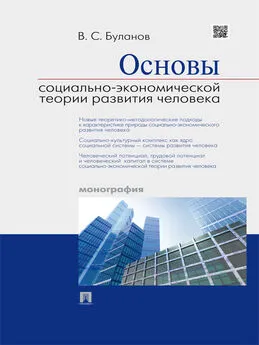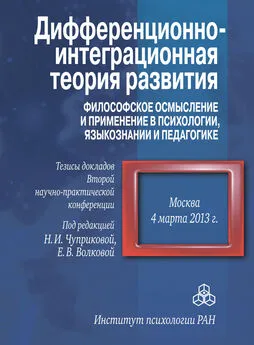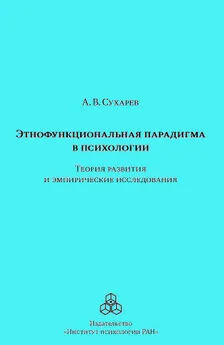Роберт Тайсон - ПСИХОАНАЛИТИЧЕСКИЕ ТЕОРИИ РАЗВИТИЯ
- Название:ПСИХОАНАЛИТИЧЕСКИЕ ТЕОРИИ РАЗВИТИЯ
- Автор:
- Жанр:
- Издательство:Деловая книга
- Год:1998
- Город:М.
- ISBN:5-88687-019-9
- Рейтинг:
- Избранное:Добавить в избранное
-
Отзывы:
-
Ваша оценка:
Роберт Тайсон - ПСИХОАНАЛИТИЧЕСКИЕ ТЕОРИИ РАЗВИТИЯ краткое содержание
Авторы книги, крупнейшие американские психоаналитики, особое внимание уделяют эго-психологии, одному из самых популярных направлений в современном психоанализе. Изданная во многих странах мира, данная книга — новейший свод психоаналитических теорий развития — стала настольной для профессиональных психотерапевтов, психологов и студентов.
ПСИХОАНАЛИТИЧЕСКИЕ ТЕОРИИ РАЗВИТИЯ - читать онлайн бесплатно ознакомительный отрывок
Интервал:
Закладка:
Lazarus, R. S., Kanner, A. D., and Folkman, S. (1980). Emotions: A cognitive phenomenological analysis. In Theories of emotion. Vol. I of Emotion: Theory, research and experience, ed. R. Plutchik and H. Kellerman. New York: Academic Press, pp. 189-217.
Lecours, A. R. (1975). Myelogenetic correlates of the development of speech and language. In Foundations of language development: A multidlsaplinary approach. Vol. I, ed. E. H. Lenneberg and E. Lenneberg. New York: Academic Press, pp. 121-155.
Leonard, M. R. (1966). Fathers and daughters: The significance of «fathering» in the psychosexual development of the girl. Int. Psychoanal., 47:325-334.
Lester, E. P. (1983). Separation — individuation and cognition. J. Amer. Psycho-anal. Assn., 31:127-156.
Levinson, N. A., and Call, J. D. (1987). New developments in early language acquisition. Basic handbook of child psychiatry. Vol. 5,ed. J. D. Noshpitzetal. New York: Basic Books, pp. 51-61.
Lewin, B. D. (1933). The body as phallus. Psychoanal. Q., 2:24-47.
Lewis, M., and Brooks-Gunn, J. (1979). Social cognihon and the acquisition of self. New York: Plenum.
Lewis, M., and Rosenblum, L. A., eds. (1974). The effect of the infant on his caregiver. New York: Wiley.
Lichtenberg, J. D. (1975). The development of the sense of self. J. Amer. Psychoanal. Assn., 23:453-451.
Lichtenberg, J. D. (1981). Implications for psychoanalytic theory of research on the neonate. Int. Rev. Psychoanal., 8:35-52.
Lichtenberg, J. D. (1987). Infant studies and clinical work with adults. Psychoanal. Inq., 7:311-330.
Lichtenberg, J. D. (1988); A theory of motivational — functional systems as psychic structures. Amer. Psychoanal. Assn., 36 (Suppi.): 57-72.
Lichtenberg, J. D. (1989). Psychoanalysis and motivation. Hills-dale, N.J.: Analytic Press.
Loewald, H. W. (1951). Ego and reality. In Papers on psychoanalysis. New Haven: Yale Univ. Press, 1980, pp. 3-20.
Loewald, H. W. (1952). The problem of defense and the neurotic interpretation of reality. In Papers on psychoanalysis. New Haven: Yale Univ. Press, 1980, pp. 21-32.
Loewald, H. W. (1960). On the therapeutic action of psychoanalysis. In Papers on psychoanalysis. New Haven: Yale Univ. Press, 1980, pp. 221-256.
Loewald, H. W. (1965). Some considerations on repetition and repetition compulsion. In Papers on psychoanahsls. New Haven: Yale Univ. Press, 1980, pp. 87-101.
Loewald, H. W. (1971). On motivation and instinct theory. In Papers on psycho-analysis. New Haven: Yale Univ. Press, 1980, pp. 102-137.
Loewald, H. W. (1973). The analysis of the self. Psychoanal. Q., 42:441-451.
Loewald, H. W. (1974). Current status of the concept of the infantile neurosis: Discussion. Psychoanal. Study Child, 29:183-190.
Loewald, H. W. (1978). Instinct theory, object relations, and psychic structureformation. In Papers on psychoanalysis. New Haven: Yale Univ. Press, 1980, pp. 207-218.
Loewald, H. W. (1979). The waning of the Oedipus complex. In Papers on psychoanalysis. New Haven: Yale Univ. Press, 1980, pp. 384-404.
Loewald, H. W. (1985). Oedipus complex and development of self. Plychoanal. Q., 54:435-443.
Locwenstein, R, M. (1950). Conflict and autonomous ego development during the phallic phase. Psychoanal. Study Child, 5:47-53.
Luria, A. R. (1961). The role of speech in the regulation of normal and abnormal behaviour. New York: Pergamon Press.
Lustman, S. L. (1966). Impulse control, structure, and the synthetic function. In Psychoanalysis: A general psychology, ed. R. M. Loewenstein, L. M. New — man, M. Schur, and A.J. Solnit. New York: Int. Univ. Press, pp. 190-221.
Maccoby, E. E., and Martin, J. (1983). Socialization in the context of the family: Parent — child interaction. In Handbook of child psychology, socialization, personality and social development. Vol. 4, ed. P. H. Mussen and E. M. Hetherington. 4th ed. New York: Wiley, pp. 1-101.
McDevitt, J. B. (1975). Separation — individuation and object constancy. J. Amer. Psychoanal. Assn., 23:713-743.
McDevitt, J. B. (1979). The role of internalization in the development of object relations during the separation — individuation phase. J. Amer. Psychoanal. Assn., 27:327-343.
McDevitt, J. B. (1983). The emergence of hostile aggression and its defensive and adaptive modifications during the separation — individuation process. Amer. Psychoanal. Assn., 31:273-300.
McDevitt, J. В., and Mahler, M. S. (1980). Object constancy, individuality, and internalization. In Infancy and early childhood. Vol. I of The course of life, ed. S. I. Greenspan and G. H. Pollock. Publication No. (ADM) 80-786. Washington, D.C.: DHHS, pp. 407-423.
McKhann, G. M.: Coyle, P. K.: and Benjamins, A. (1973). Nutrition and brain development. Assn. Research Nervous Mental Diseases, 51:10-22.
Mahler, M. S. (1952). On child psychosis and schizophrenia: Autistic and symbiotic infantile psychosis. Psychoanal. Study Child, 7:286-305.
Mahler, M.S. (1961). On sadness and grief in infancy and childhood: Loss and restoration of the symbiotic love object. Psychoanal. Stud. Child, 16:332-351.
Mahler, M. S. (1963). Thoughts about development and individuation. Psycho-anal. Study Child, 18:307-324.
Mahler, M. S. (1971). A study of the separation — individuation process and its possible application to borderline phenomena in the psychoanalytic situation. Psychoanal. Study Child, 26:403-424.
Mahler, M. S. (1972a). On the first three subphases of the separation — individuation process. Int.J. Psychoanal., 53:333-338.
Mahler, M. S. (1972b), Rapprochement subphase of the separation — individuation process. Psychoanal. Q., 41:487-506.
Mahler, M. S. (1975a). On human symbiosis and the vicissitudes ofindividuation. J. Amer. Psychoanal. Assn., 23:740-763.
Mahler, M. S. (1975b). On the current status of the infantile neurosis. J. Amer. Plychoanal. Assn., 23:327-333.
Mahler, M. S. (1981). Aggression in the service ofseparation — individuation: A case study of a mother — daughter relationship, Psychoanal. Q., 50:625-638.
Mahler, M. S., and Purer, E. (1968). infantile psychosis. Vol. I of On human symbiosis and the vicissitudes ofmdivuluatlon. New York: Int. Univ. Press.
Mahler, M. S., and Gosliner, B. J. (1955). On symbiotic child psychosis: Genetic, dynamic, and restitutive aspects. Psychoanal. Study Child, 10:195-212.
Mahler, M. S., and McDevitt, J. B. (1968). Observations on adaptation and defense in statu nascendi. Psychoanal. ()., 37:1-21.
Mahler, M. S., and McDevitt, J. B. (1980). The separation — individuation process and identity formation. In Infancy and early childhood. Vol. I of The course of life, ed. S. 1. Greenspan and G. H. Pollock. Publication No. (ADM) 80-786. Washington, D.C.: DHHS, pp. 395-406.
Mahler, M. S.; Pine, F.; and Bergman, A. (1975). The psychological birth of the human infant. New York: Basic Books.
Mandler, G. (1980). The generation of emotion. In Theories of emotion. Vol. I of Emotion: Theory, research and experience, ed. R. Plutchik and H. Kellerman. New York: Academic Press, pp. 219-243.
Mandler, J. M. (1983). Representation. In Handbook of child psychology. Vol. 3, ed. P. H. Mussen. 4th cd. New York: Wiley, pp. 420-494.
Mandler, J. M. (1988). How to build a baby: On the development of an accessible representational system. Cogn. Develop., 3:113-136.
Masters, W. H., and Johnson, V. E. (1966). Human sexual response. Boston: Little, Brown.
Mayer, E. (1985). «Everybody must bejust like me»: Observations on female castration anxiety, int.]. Psychoanal., 66:331-347.
Meissner, W. (1980). A note in projective identification./. Amer. Psychoanal. Assn., 28:43-68.
Meltzoff, A. N. (1982). Imitation, intermodal coordination and representation in early infancy. In Infancy and eplstomology, ed. G. Butterworth. Brighton, England: St. Martin's Press, pp. 174-192.
Meltzoff, A. N. (1985). Perception, action, and cognition in early infancy. Am. Pediatrics, 32:63-77.
Meltzoff, A. N. (1988). Infant imitation and memory: Nine-month — olds in immediate and deferred tests. Child Develop., 59:217-225.
Metcalf, D. R. (1979). Organizers of the psyche and EEC development: Birth through adolescence. In Basic handbook of child psychiatry. Vol. I, ed. J. D. Noshpitz et al. New York: Basic Books, pp. 63-71.
Metcalf, D. R., and Spitz, R. A. (1978). The transitional object: Critical development period and organizer of the psyche. In Between reality and fantasy, ed. S. A. Grolnick and L. Barkin. New York: Aronson, pp. 99-108.
Meyer, J. K. (1980). Body ego, selfness, and gender sense: The development of gender identity. Psychiatric Clinics of North America, 3:21-36.
Modell, A. H. (1969). Object love and reality. London: Hogarth.
Modell, A, H. (1975). A narcissistic defense against affects and the illusion of self-sufficiency, Int. J. Psychoanal., 56:275-282.
Modell, A. H. (1984). Psychoanalysis in a new context. New York: Int. Univ. Press. Money, J., and Ehrhardt, A. (1972). Man and woman, boy and girl. Baltimore: Johns Hopkins Univ. Press.
Money, J.; Hampson, J. G.; and Hampson.J. L. (1955a). An examination of some basic sexual concepts: The evidence of human hermaphroditism. Bull. Johns Hopkins Hasp., 97:301-319.
Money, J.; Hampson, J. G.; and Hampson J. L. (1955b). Hermaphroditism: Recommendations concerning assignment of sex, change of sex and psychologic management. Bull. Johns Hopkins Hasp., 97:284-300.
Montagner, H. (1983). New data in the ontogeny of communications systems and biological rhythms in young children. In Frontiers of infant psychiatry, ed. J. D. Call, E. Galenson, and R. L. Tyson. New York: Basic Books, p. 456.
Moore, B. E. (1976). Freud and female sexuality, int. J. Psychoanal., 57:287-300.
Moore, B. E., and Fine, B. D., eds. (1990). Psychoanalytic terns and concepts. New Haven and London: Amer. Psychoanal. Assn. and Yale Univ. Press.
Moran, G. S. (1987). Some functions of play and playfulness. Psychoanal. Study Child, 42:11-29. Mliller-Braunschweig, C. (1926). The genesis of the feminine super-ego, Int. Psychoanal., 7:359-362.
Muslin, H.L. (1972). The superego in women. In Moral values and the superego concept, cd. S. C. Post. New York: Int. Univ. Press, pp. 101-125.
Myers, W. (1976). Imaginary companions, fantasy twins, mirror dreams, and depersonalization. Psychoanal. 45:503-524.
Myers, W. (1979). Imaginary companions in childhood and adult creativity. Psychoanal. Q., 48:292-307.
Nachman, P. A., and Stern, D. N. (1984). Affect retrieval: A form of recall memory in prelinguistic infants. In Frontiers of infant psychiatry. Vol. 2, ed. J. D. Call, E. Galenson, and R. L. Tyson. New York: Basic Books, pp. 95-100.
Nadelson, C. C.; Notman, M. T; Miller, J. В.: and Zilbach. J. (1982). Aggression in women: Conceptual issues and clinical implications. In Aggression, adaptations, andpsychotherapy. Vol. 3 of The woman patient, ed. M. T. Notman and С. С. Nadelson. New York: Plenum, pp. 17-28.
Nagera, H. (1966). Early childhood disturbances, the infantile neurosis, and the adulthood disturbances. New York: Int. Univ. Press.
Nagera, H. (1969). Imaginary companion: Its significance for ego development. Psychoanal. Study Child, 24:165-196.
Nagera, H. (1975). Female sexuality and the Oedipus complex. New York: Aronson.
Neubauer, P. B. (I960). The one — parent child and his oedipal development. Psychoanal. Study Child, 15:286-309.
Neubauer, P. B. (1980). The role of insight in psychoanalysis. In Psychoanalytic explorations of technique, ed, H. P. Blum. New York: Int. Univ. Press, pp. 29-40.
Neubauer, P. B. (1984). Anna Freud's concept of developmental lines. Psycho-anal. Study Child, 39:15-27.
Читать дальшеИнтервал:
Закладка:










